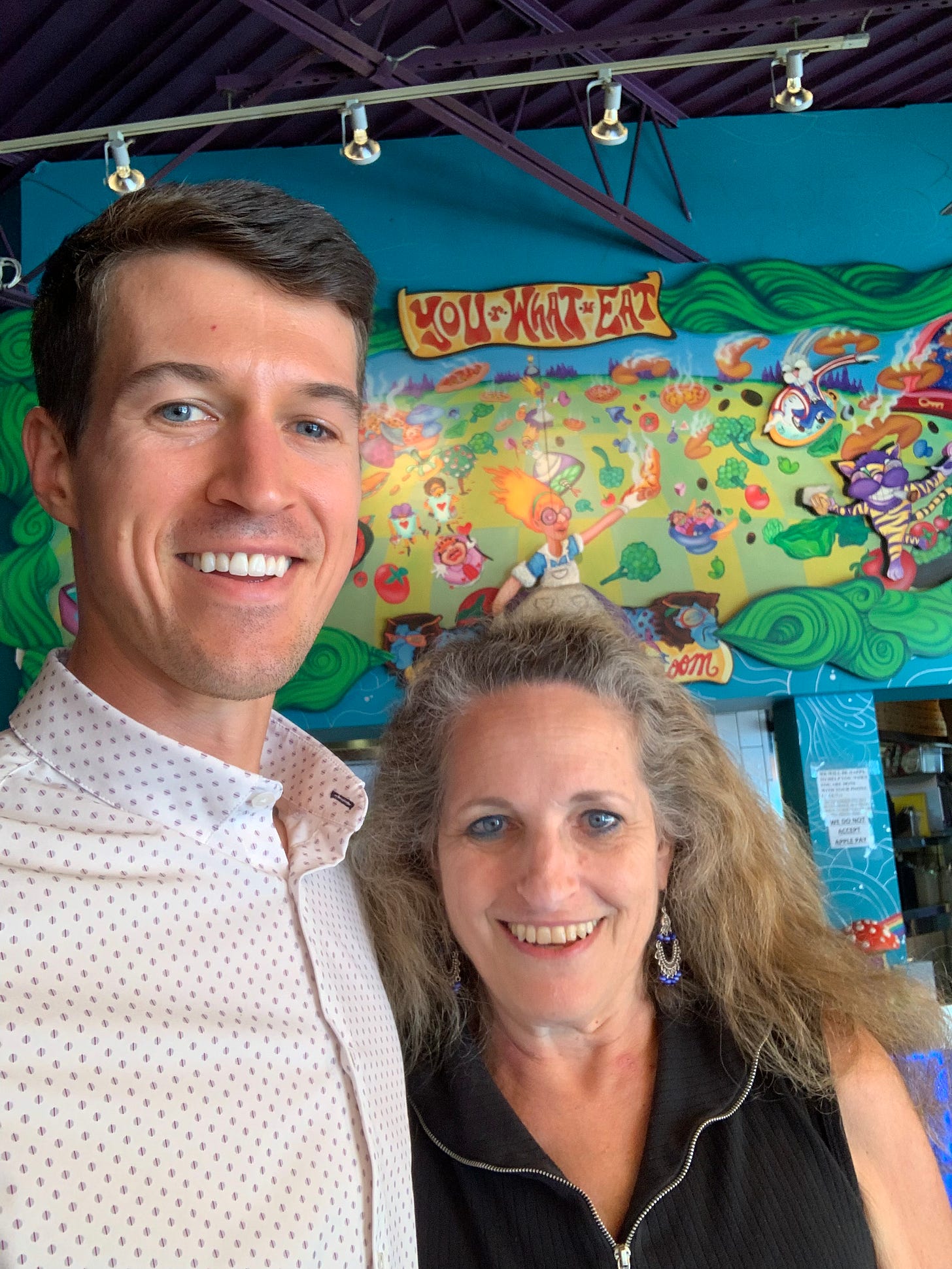Founder and Executive Editor, Saporta Report - a trusted voice for civic Atlanta journalism
Met at Mellow Mushroom on Monroe (because the kitchen at Apres Diem was flooding!)
As a refresher, I’m grabbing coffee with 100 good people in Atlanta and sharing inspiring takeaways.
Primer: The Atlanta Way
The term "Atlanta Way" refers to a set of principles and strategies that Atlanta’s civic leaders employed to address racial and social issues, particularly during the Civil Rights Movement and its aftermath. The Atlanta Way has been celebrated for a commitment to collaboration, nonviolent protest, diverse political power, and a rising tide of economic growth lifting many boats (hence the popular slogan ‘The City Too Busy to Hate’).
Critics of the Atlanta Way site a lack of transparency associated with behind-the-scenes deals brokered by an old-boy network of political and business leaders; one that hasn’t adequately reflected or prioritized the needs of all Atlanta residents.
A unique perspective since day 1
Maria Saporta’s dad was an architecture professor at Georgia Tech. She was born in 1955 and grew up in an eight-story highrise on North Avenue, effectively on Tech’s campus.
Her parents were Spanish Jews who lived in various places throughout Europe and each spoke a half-dozen of languages. Wanting Maria to retain some of her European heritage, they spoke exclusively French at home. She started Kindergarten in remedial English because she knew just four words: “Yes, No, Me, Okay.”
It was an atypical start for someone who’s made her living through the written word. Maria fell in love with journalism working on the high-school paper at Grady, and went on to join the Atlanta Journal-Constitution in 1981. She became its first (and only) female business columnist in 1991, believing that in Atlanta, decisions could be traced to business leaders.
She left after 27 years and later founded the eponymous Saporta Report, where she and her team strive to provide even-handed coverage of Atlanta’s civic affairs.
Carrying MLK’s legacy forward: Atlanta is for everyone
Maria doesn’t want any of the Saporta Report behind a paywall, believing it’s wrong to restrict access to journalism. This reflects her unwavering commitment to equality of access.
This was one of her family’s most deeply-held values. Her mother spent a year in a German concentration camp before immigrating to the US. During the war, they became atheists, believing it was fundamentally incompatible for a loving God to allow the suffering they had witnessed. Nevertheless, they raised her with a loving conviction that people were inherently good and deserved equal rights, and she spent her childhood years picketing and protesting alongside Atlanta’s civil rights leaders.

Maria was close friends with Yolanda King, the eldest of Martin Luther King Jr.’s four children. She believes she was the first white girl to spend the night at the Kings’ house. She recounted drying the dishes while Martin washed them after Saturday night dinners — he was inquisitive and genuinely curious about her perspective on the world, even as an 11-year-old. The next morning they’d all go to Ebenezer Baptist Church to hear him preach.
Even then she felt they believed in similar tenets of a just society, inherent equality, and non-violence, even if they had different conceptions of God.
Maria is now a co-founder of the nascent Atlanta Way 2.0, a modern-day movement to bring together diverse stakeholders to improve community relationships, share resources, and strengthen the civic fabric of our city through strategic connections and collaborations between individuals, groups and organizations in communities and regionally.
The spirit of the movement is to build upon what worked from the legacy Atlanta Way - while ensuring that participation and decision-making is shared more broadly, rather than being led by a relatively homogenous inner circle of business and civic leaders.
“Church can be divisive; it leaves people out”
I asked Maria about the thinking for how to structure Atlanta Way 2.0 — whether it would be a business, a nonprofit dependent on funding from the business community, or even a faith-based institution.
Atlanta Way 2.0 is trying to connect people, to celebrate and intensify our shared bonds, solidarity, and mutual dependence, and ultimately to help people belong. I wondered aloud: isn’t that what it feels like when people are “well-churched?”
Maria immediately bristled at the term. I didn’t even mean it with the specific Christian context compared to the general notion of how people benefit from being part of a thriving faith-based organization. Still, Maria recounted a lifetime of feeling ‘othered’ in the American south by ubiquitous references to Christianity and how it’s been used to draw lines of exclusion rather than the universal love espoused by its founder.
We have to recognize that, while the best churches can fuel the engines of activism, belonging, and community, the Church has harmed many people. Maria and her collaborators are imagining a path to the more blessed society just as Martin Luther King Jr. did, albeit through another context. And they want everyone to have a seat at the table.
From Maria, about her spiritual journey:
Although I grew up in a secular household with parents who were proud of their Jewish heritage, we took weekly Sunday outings in nature – at state parks, nearby woods and lakes – anywhere surrounded by trees, plants and all living things. This was my connection to a higher being. Both my parents were deeply spiritual, loving music and the magic of the rising or setting sun. That deep connection to nature and a healthy earth remains an important part of my core beliefs today. In fact, one of our priority areas with Atlanta Way 2.0 is to help the environment.
My Reflections & Questions for Discussion
Frankly, half of the business ideas I cook up I wind up throwing out after realizing they’d be better delivered by a religious institution. I believe a major, under-appreciated determinant of our ability to thrive is whether we are well-churched (whether you’re Christian or from any religious tradition).
There is an irreplaceable positive formation that comes from seeking to live in worship of life and love, in pursuit of transcendent values, alongside a group of seekers doing the same.
Sadly, I think the momentum is shifting away from being well-churched and forming deep communal bonds. People are lonely. Even many people who aren’t lonely might be substituting religion for community-building avenues like shared sports fandom, membership in a social club or recreational pursuit, or some other casual linkage.
Don’t get me wrong - those social outlets provide important avenues for connection. But I can’t help but feel they are likely shallower than the depthful belonging we all crave.
Should an organization like Atlanta Way 2.0 be trying to foster similar community building to a religious institution? Where is the line between a values-oriented, secular organization and a faith-based group?
Finally, I was struck in my conversation with Maria that Christianity has ceded the moral high ground, and with that, some degree of its ability to serve as a unifying force for love and justice. I believe this must be an imperative for the church to remain relevant: serving as a beacon for how people can unite and thrive in this increasingly challenging era of intensifying technology and political instability. What practical steps could, and should, the church take to make that happen?
I’m curious - if you grew up going to a religious institution but don’t now, what would it take for you to start attending again regularly?
If you’re enjoying these, I’d love to hear from you via a comment or please share with someone else who’d like to read.
About Mellow Mushroom & Apres Diem:
Maria and I were originally going to Apres Diem, a delightful indoor/outdoor French restaurant tucked into the Midtown Promenade - but their kitchen had a leak!
Maria suggested Mellow Mushroom in the same complex and I immediately noticed my ego activated - it’s not really the 100 Atlanta Coffees concept (they don’t even serve coffee)…plus it’s a chain??
Well, allow me to park that egoic line of logic at the colorful door and celebrate an Atlanta success story: Mellow Mushroom was founded by Georgia Tech students in 1974, with the name being an ode to the founders’ fungal eccentricities.
Each of the 170+ locations is locally owned and individually decorated. They’ve survived 40 years with delicious pies and southern hospitality. Good on you, Mellow Mushroom.
About 100 Atlanta Coffees:
I decided to publish takeaways from having coffee with 100 Atlantans as a way to shine a light on some of the good souls, and local spots, in our city.
Maria was introduced to me by Ann Cramer, who was featured in Edition 007. Thanks, Ann!






Wondering if you received my email from last weekend?
I notice that though your guest bristled at the term, well-churched remains one of your phrases of choice. I understand why. It is consistent with your (our) religious upbringing and church remains a vibrant part of your life. I have always loved and will continue to live MY church (Home Moravian), even though I am seldom able to attend worship there. I was “well-churched” at Home and life apart from it remains nearly unthinkable.
That said, I think the term church and the phrase well-churches are tainted and perhaps in the way of a truly inclusive Movement of the Spirit. Fundamentally, I believe church happens where we are, when we are gathered with others, any others, and are exhibiting and sharing love for one another. Just being with others opens the pathway for the Holy Spirit to enter into the moment in a way that can be transformative. Our sharing of love, joy, compassion, kindness, pick your fruit of the Spirit, enables us to manifest anywhere, with anyone, the living Body of Christ. We do not have to name it as such, and for the sake of avoiding alienating others, we shouldn’t. Far better that we simply exhibit sensitivity and openness to others beliefs and faith experiences than to insist that those experiences fit our terminology.
I agree that Christianity has a bad reputation, well-earned some might say. The same might be said of Islam, and of Judaism, of any religion that exhibits fundamentalist ideologies and theologies that foster judgement and an us vs them mentality. Anyone who claims ownership of the Sacred, who says our way is The Way, operates in opposition to Grace, which such persons seldom exhibit and likely have never truly allowed themselves to experience. Christianity would have fared far better over the centuries had the Johanine quote, “I am the Way” been omitted, as I’m certain many of Jesus’ teachings were by accident or by intention. Everyone wants to feel they are part of the chosen ones but this is not possible without identification of the unchosen in all their identifiable otherness.
I think the Church as we have understood it (here is the church, here is the steeple, and WE are the people) is evolving. Its structures are proving inadequate to generate inspiration and transformation. It has become our object of worship too many times rendering us good members of our specific group devoted to its maintenance, sustenance, and preservation of its identity. If all the churches closed their doors at once, sold all their assets and gave the proceeds to the poor, I wonder what would emerge in its place. Something small and local, something defined by relationships I would hope, something not bound to a place, but unfolding in the market square and main streets, something loving in a way that is magnetic and that draws people into the experience of Love. That it’s so hard to imagine this alternative says something about how “well-churched” we have become over the centuries. And yet we feel disconnected, adrift, anomalous, craving connection, and starved for wonder. An “un-churched” faith, hope, and love shared person to person right where we are living our “real” lives might be preferable if not urgently needed at this time.